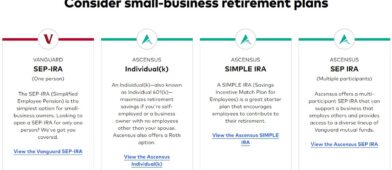99% of the time, I say yes.
Before I started working for myself, I had two previous jobs. In both cases, I rolled over my 401(k) into a Rollover IRA at Vanguard.
I did this because Vanguard offered better and cheaper investment options compared to my previous employers’ plans. Vanguard doesn’t charge annual maintenance or administrative fees, which both of my previous employers’ plans did. It wasn’t a high fee, I seem to remember it being around $50 a year, but why pay for something when you don’t have to!
My decision was very clear – better investment options, cheaper investment options, and removing a $50 expense – rolling it over was a clear winner.
But what if you’re in this situation and the answer isn’t so clear cut? What should you think about when deciding?
Here’s how I approach this problem (in order of most important to least important):
Table of Contents
Do You Get Better Investment Options?
My 401(k) plans all had fewer than twelve funds and several were high priced, actively managed funds that wanted 1%+ each year to manage my money. I fully subscribe to the theory that index funds are all I need, and the plans had pretty slim pickings for index funds. In fact, with one plan, they had an index fund that charged an expense ratio of close to 1%! Why!?
When you open a Rollover IRA elsewhere, you can buy anything the account permits. At Vanguard, I get access to any fund, ETF, or stock that I want. I can buy non-Vanguard funds too. They do not care (nor should they!).
This is true at Fidelity, Charles Schwab, etc.
The way I think of it is, “It’s my retirement, why should I let a stranger curate my options?”
Is It Cheaper?
Actively managed funds have their place in the world, but when most of the options in a 401(k) are actively managed, it’s bad. They charge a lot in fees and that can erode your retirement savings significantly. A worker’s 401(k) is going to be the main engine of their retirement, and if you’re forced to buy from a handful of options curated by someone who may be compensated for it… that’s a bad deal.
When you leave the ecosystem (that is a company’s 401(k) plan) you no longer face those constraints, and your options will be much better because there will be more. You don’t have to invest in those options, but having them available enables you to make better decisions.
Also, account management fees are likely lower. Most of the major brokerages have ways to get maintenance fees waived, usually involving electronic delivery of statements. Avoid that $50 annual fee that gets you nothing!
(also, you should always look for a high dollar rollover IRA promotion and get free cash in the process)
Will It Simplify Your Financial Life?
I really like keeping my financial situation as simple as possible. Right now, I know how all our accounts are interconnected, even if I didn’t have our financial network map in front of me. Anything is easier to manage if it’s simpler.
Will rolling your 401(k) over into a Rollover IRA make your life simpler?
My 401(k) was managed by a large brokerage firm, and the account was segregated from everything else. If I had another account with that firm, my 401(k) would still be separate. The systems were separate because my investment options were limited to what the administrators decided were “good” options (for what it’s worth, one of my previous employers settled a lawsuit regarding their savings plan!). The system also was a white-labeled system that had my former company’s logo and name to complete the look and feel.
Rolling them all to one place meant I could manage them with one login–very simple.
Can You Get Cheaper Portfolio Management?
This wasn’t available when I had a 401(k), but some people have told me that some 401(k) plans have robo-advisory services and portfolio management. Basically, they run their own private Betterment-like service except you pay upwards of 1% for them to manage your portfolio.
First, that’s absurdly expensive. Betterment charges just 0.25% each year and other services are similarly priced. You can read a full review of Betterment if you want to read what they do.
Also, no one charges 1% because that’s highway robbery!
Second, with the limited investment options in a 401(k), paying 1% to manage it is crazy talk.
Sometimes It’s Better to Cut Ties Completely
One final consideration in the “pro moving” camp is that it severs the last tie you would have with your former employer. Depending on the reason why you left, whether it was your choice or not, you may harbor feelings towards the employer.
If the company is small and you left for greener pastures, maybe the people left behind will feel a certain type of way about it. Maybe the plan administrator, who may also be the only person in HR, will feel less than happy feelings.
This may be overblowing it because this is not the case for most people… but for some it’s true.
(what if you forget your password and need to call someone to reset it? yikes!)
While it’s not a strong tie, just having a reminder that you have financial assets with the 401(k) can be a negative. In those cases, it’s better to move it to a brokerage where you’re just another customer. Vanguard charges you the same fees no matter who you are and they don’t have a say in what you should be invested in. 🙂
Need help rolling over your 401(k) into an IRA?
Keeping your old 401(k) with a former employer is usually not a great idea but if you don’t want to move it yourself, you can work with a company like Capitalize to do it for you. They will help you find the best IRA for your needs and move it over – for free.
One Reason Not To Move…
It’s not difficult to rollover your 401(k) to a Rollover IRA, especially if you already have one set up with the new brokerage, but it does take time. If you’ve never done it before, there are forms to fill out and you have to wait a bit for things to process. It can be a little stressful because it’s probably quite a large sum of money but it’s a common process and brokerages know how to do it.
But, consider how much you’ll save … tens of thousands of dollars over the next few decades as you get better options, pay less in fees, and simplify your life. 🙂
If you rollover your 401(k), your plan administrator will typically write you a check that you will send to your new brokerage. You have 60 days to make sure the check is cashed into your Rollover IRA. If you fail to deposit it, there are penalties involved. It’s not hard to do but just know you can’t start the process, wait for too long, and then continue it. You must follow through completely, or there will be tax consequences.
If you’re worried, there are services like Capitalize that will help you with the process.
Did that answer all your rollover questions? If not, ask away!





To Rollover, my 401(k) or not to Rollover my 401(k) has never been a question for me. I choose Rollover!
What I’ve always wondered is whether I can before I leave my job (e.g., annually ). For two reasons I would like to Rollover, I seek simplicity and I can’t invest in the two funds I have in my IRA.
Generally, no, but some companies allow it. It’s commonly referred to as an “in-service rollover” and you’ll have to ask your HR if they permit it.